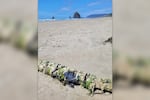
Tar patty on Cannon Beach, Ore., on May 23, 2024, with Haystack Rock in the distance.
Courtesy of the Oregon Department of Environmental Quality
Nearly three weeks after oil coated and killed several birds on the Oregon and southern Washington coasts, officials say they still don’t know where the sticky petroleum product came from.
But they say they’ve done their best to clean up the areas that were affected by the mysterious balls of tar that washed up — and they’ve ended a unified command effort that brought together multiple Oregon, Washington and federal agencies to investigate.
Samples of the sticky substance were seen as far north as Long Beach, Washington, all the way down to Yaquina Head, Oregon. They were first reported on May 19, when several tar balls were spotted around the mouth of the Columbia River by different state agencies.
At least 10 birds had been found covered in oil by May 21, and three of them later died. All the affected birds found were common murres.
Related: Officials search for source of oil that’s coated, killed Northwest coastal birds
Since then, more than 100 people from a dozen federal and state agencies — including U.S. Coast Guard, Oregon Department of Environmental Quality and Washington Department of Ecology — were involved in response to the environmental disaster, collecting nearly a ton of oily debris and cleaning 36 miles of beach.
Over the past several days, responders took advantage of the low tides following stormy weather along the coast to resurvey and clean the impacted areas, according to DEQ.
The agency added that, while the unified effort is over, the investigation continues.
As the tar is mostly cleaned up, DEQ asks if anyone does find oiled birds or other wildlife, they should avoid contact with the animals and call 1-800-22-BIRDS (1-800-222-4737). The agency also advises people not to touch any tar balls when they see them on the beach, and to report them to the National Response Center at 1-800-424-8802.
If you find tar on the beach, wash with soap or degreasing dishwashing detergent & water. Avoid using solvents, gasoline, kerosene, diesel fuel or similar products.
— OregonDEQ (@OregonDEQ) June 8, 2024
• Oily substance on the beach? Call OR Emergency Response System: 800-452-0311.@MyODFW @ORStateParks 3/4 pic.twitter.com/m2e0zjCUBN
Courtney Sherwood and Joni Auden Land contributed to the story.
